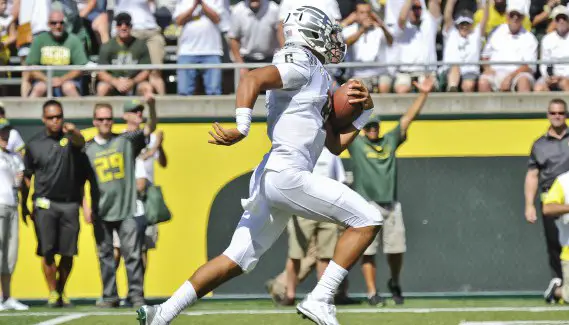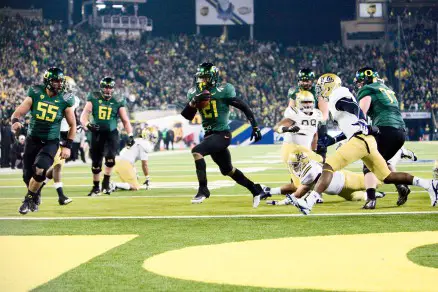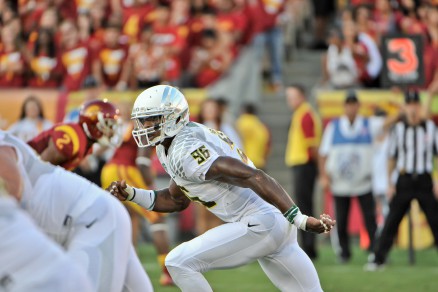Oregon will never win any recruiting championships. While teams such as Alabama, USC and LSU tend to dominate in the rankings, the Ducks rarely crack the top-15. Year after year they bring in solid, but unspectacular recruiting classes, yet year after year, Oregon takes those same recruits and turns them into champions.
Why is that? What is the key that allows teams without the same recruiting power as the USCs and Alabamas to find and develop players that those same schools routinely ignore? Is it a better method of discerning hidden skills? A system of identifying strengths unseen by other schools?
A perfect example of this is Marcus Mariota. Labelled as a three-star recruit by Scout.com and Rivals.com, Mariota was only offered a scholarship by two universities: Oregon and Memphis. Then-assistant coach Mark Helfrich was so enamored of Mariota that after observing a single practice session, he convinced Chip Kelly to immediately offer him a scholarship. Mariota had yet to start a game.
LaMichael James was another standout for Oregon who flew somewhat under the radar. A three-star recruit according to Scout.com and four stars by 247sports.com, James was recruited by more schools than Mariota, but none of those offers were from teams that regularly contend for national championships. Certainly a lot of schools were deterred by his size, but Oregon saw something in him that other schools did not. The Ducks made an offer, LaMichael accepted, and he is now considered one of the all-time great running backs in Pac-12 history.
Oregon football history is filled with players such as James and Mariota. There have been so many who were overlooked, snubbed and ignored by the bigger schools, who then came to Oregon and showed the world what so many had missed. It’s part of Oregon’s football identity. But what is the process that allows the Ducks to find so many great players where others did not look?
One of the first things that the school looks for is character. While bigger and wealthier schools rely much more on physical specimens that garner four-or-five star rankings, Oregon is often looking for more subtle attributes like leadership, humility and accountability.
One only has to look to Mariota for a perfect example of this. And while there have been players who have experienced moral growth opportunities (Kiko Alonso, LaGarrette Blount and even James), most of them have redeemed themselves and held themselves accountable. Oregon rarely experiences a player failing so often that he is forced from the team, and when it does happen, it is usually for behavior that would draw a slap on the hand under less-upstanding programs.
Another aspect of recruitment is speed. Of course, all teams want speedy players, but few teams in the country emphasize it as much as Oregon. No position on the Ducks is exempt from this. Big lumbering linemen? Better look elsewhere. Stand-in-the-pocket NFL-type quarterbacks? Not here. If a player gets a look from Oregon, then it is guaranteed that player is fast.
One of the most important aspects of Oregon’s long-term success is player development. Oregon will often take a chance on a player knowing that with the tools at their disposal, they can turn young men with a rough edge into polished jewels by the time they leave the school.
An excellent example is Dion Jordan. Recruited as a tight end, the coaches saw in him the potential for a dominant defensive player, and by his sophomore year, he was playing defensive end. By the time he left Oregon he was thriving at the position.
A history of steady coaching is another way to develop young, overlooked players. Young men considering the school don’t have to worry about whether the coach who is recruiting him will be gone in a year or two. The University does not have a panic button, and this is reflected on how constant the coaching positions have been.
The coaches who come to Oregon generally do not view it as a stepping stone to more lucrative or glamorous jobs. Oregon is a place where coaches want to be, and to stay. With some of the best fans in the country, sparkling facilities and one big sugar daddy in Phil Knight, the head coaching position for the Ducks is one of the premiere gigs in the nation. By having coaches who want to stay, it allows them to further develop the talent they recruit.
Once again, this year’s recruiting class is nowhere near the top ten in the nation. It’s not even considered one of the top Pac-12 classes. Yet the only concern about this class is mostly expressed from outsiders who don’t seem to ‘get’ the way Oregon recruits.
Pundits scratch their collective heads and wonder if the team is headed for a negative turn in its fortunes. In the years to come, those same experts will continue to shake their heads as this little school from a small town in the Northwest keeps on winning with players no one wanted.
It’s the Oregon way.
Top photo Kevin Cline
Related Articles:
Chip Kelly Update: Everything's Good Again ...
Chip Kelly Update: Wailing and Gnashing of Teeth
Shock and Awe -- The Oregon Ducks' Football Hangover Effect
Despite Lopsided Score, Georgia State "Never Stopped Believing"
Hope Springs Eternal for Ducks
Incompetent Pac-12 Officials: How Do You Miss ALL of THIS?
Don Gilman is a second-year communications major at Umpqua Community College in Roseburg, Oregon. In addition to writing for FishDuck.com, he has been published in the Roseburg News-Review Newspaper, the UCC Mainstream Newspaper, Bucketlist Publications and is the featured author in the June, 2013 edition of eHorror magazine (under a pseudonym.) In 2013 Don received two awards from the Oregon Newspaper Association’s annual statewide college competition: Third place for Best Feature Story and second place for Best Spot Photography.



